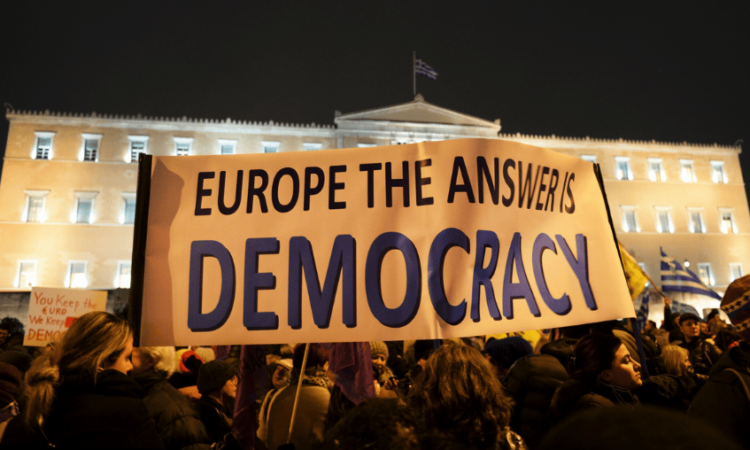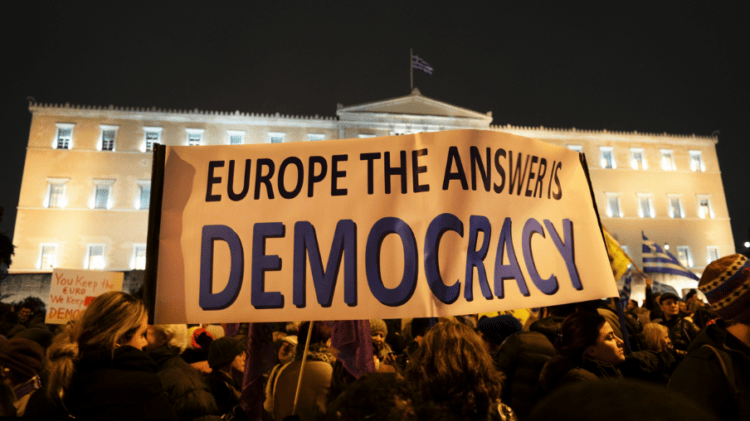
Finance ministers must forestall reapplication of the existing fiscal rules, to prevent a disastrous renewal of austerity.

European Union ministers of finance and economics gather today in Brussels to discuss the long-overdue reform of the EU’s economic governance. If they cannot find agreement, the path ahead could be of renewed austerity—leading to a disaster on social, economic, environmental and political fronts.
The current fiscal rules, enshrined in EU regulations called the Stability and Growth Pact but also in the treaties, mandate that member states limit their public debt to 60 per cent of gross domestic product and their budget deficit to 3 per cent of GDP. The rules were paused in March 2020, through the general escape clause built into the pact—first to allow governments to support households and businesses during the severe downturn occasioned by Covid-19 and later to shield them from the energy-price increases stemming from the war in Ukraine.
‘Fiscal consolidation’
During these turbulent years, half the member states accumulated deficits and debts beyond the ceilings. If the finance ministers do not find common ground for reform, the escape clause will end and the existing rules will reapply, starting from January.
This would drive many countries to ‘fiscal consolidation’—huge cuts in public spending, including on the transition towards climate neutrality and on public services. These would erode the social rights of those already struggling with the increasing cost of living. Renewed austerity would hit particularly hard the countries with public debt above 100 per cent of GDP: Greece, Italy, Portugal, France, Spain and Belgium.
Without a deep reform of the EU fiscal rules, we shall witness a fourfold disaster:
- A social disaster: cuts in healthcare, childcare, education, public transport, pensions and unemployment allowances would exacerbate inequality at a time when the extreme wealth of a few continues obscenely to rise. Already, more than a fifth of the EU population is at risk of poverty or social exclusion. Public services play an equalising role in societies and must be strengthened—not further dismantled, hitting the most vulnerable hardest. Indeed the need for social protection and services will grow in the face of climate shocks and the transition towards a circular and decarbonised economy, no longer geared to overproduction and overconsumption.
- An economic disaster: austerity was imposed on several EU countries when the eurozone crisis hit, the cuts in public spending not only curbing rights to health, education and social protection but also lowering investment in the economy from 2010. The EU learnt the lessons and, as a result, introduced during the pandemic a temporary job-guarantee scheme for workers (SURE) and a Recovery and Resilience Facility (RRF), to allow member states to protect people and rebuild their economies. Imposing massive cuts in public spending now would jeopardise the positive effects of this injection of fresh money and kill recovery—reducing the chances of seeing the debt/GDP ratios fall. Too tight EU fiscal rules would also deepen economic disparities among member states: the relaxation of the ‘state aid’ constraints on unfair competition, in the face of green subsidies introduced in the United States, means that countries such as Germany and France can support their industries more than other member states whose investments are precisely constrained by the debt and deficit rules.
- An environmental and climate disaster:inaction for so long has left Europe with a very tight timeframe to transform its economy to fit science-based planetary boundaries, constraining global heating to 1.5C from pre-industrial times, and if the fiscal rules continue to prevent public investments at scale the EU’s climate goals will not be met. The European Commission now estimates that to implement the European Green Deal and make the transition to renewable energy, an annual funding shortfall of €620 billion must be filled. While private finance has an important role, not all these investments will generate a high-enough financial return quickly enough to make a business case—massive public investments will be needed too. For the planet, there could not possibly be a worse moment to restart austerity measures.
- A political disaster:further cuts in public spending without initiatives to tax wealth across all EU countries—when wealth inequality has been exacerbated during the pandemic and fossil-fuel, banking and food-retail companies have posted record profits since the war in Ukraine while more and more people cannot pay their bills—would fuel rejection of mainstream political parties. This would be the perfect recipe for more and more votes in the European elections next June endorsing nationalistic, racist, inward-looking approaches. Amid geopolitical turmoil and the burning climate threat, we need more than ever to act together for social justice, climate and the environment, as well as peace and human rights in Europe and around the world—that is what the EU ‘project’ needs to be.
More flexibility
In April, after extensive consultations, the commission tabled a legislative proposal on the fiscal rules. That is the text the economy and finance ministers are discussing, aiming to agree on a general approach to the reform. The proposal would amend the Stability and Growth Pact—changing the EU treaties being much more complex and protracted.
While retaining the goal of limiting public debt to 60 per cent and the budget deficit to 3 per cent of a member state’s GDP, the proposal on the table would introduce more flexibility as far as the debt is concerned. Each country would have to follow a tailored pathway, with more time than under the current rules to reduce its debt. Member states would be encouraged to spend on common EU priorities, including climate action and the energy transition, and to back these investments with appropriate policy reforms.
This would move away from an obsessive focus on quantitative criteria, ignoring the impact on climate and the environment. Tiny steps in the right direction but definitely not enough.
Climate and social objectives
Finance ministers need instead to set the EU’s macro-economic rules by its climate and social objectives. Such rules should encourage member states to invest in ‘just transition’, rather than pushing them to generate indiscriminate GDP growth. They should also ensure that the investments and reforms proposed by member states in their national budget plans are not harming the climate and the environment—the RRF already incorporates such a ‘do no significant harm’ criterion. This should entaill, for example, cutting down fossil-fuel subsidies and investing in socially just renewable-energy projects instead. Last but not least, member states should indicate to what extent their budget plans contribute to or contradict their own climate objectives, by applying green budgeting tools.
Reform of the fiscal rules is a very divisive topic among member states. Germany is leading a group of countries which want debt-reduction benchmarks applying to all, regardless of the national context and the social and climate consequences. Not a single government champions rules that would ensure that public spending does not harm the EU’s climate and social goals: they all want to keep their sovereign power to fund whatever they like, even if this contradicts the vital goals they have collectively set themselves.
Become a Social Europe Member
Support independent publishing and progressive ideas by becoming a Social Europe member for less than 5 Euro per month. Your support makes all the difference!
The EU’s current fiscal rules are promoting an economic model generating climate change. Much deeper economic-governance reform is needed. But, once more, our government representatives may not be up to it.







